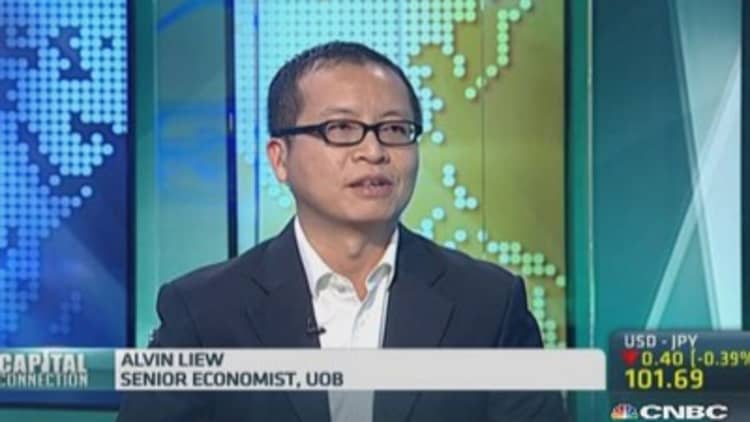Japan's economy is expected to have lost all the ground it gained earlier this year during the second quarter as the April consumption tax hike appears to have thrown the fragile recovery off its tracks.
Asia's second-largest economy, which is set to release gross domestic product (GDP) data on Wednesday, shrunk an annualized 7.1 percent in the April to June quarter, according to a Reuters poll, down sharply from a 6.7 percent gain in the previous three months.
"The consumption tax hike that started in April will have a broad-based impact on demand components with consumption, residential investment and capex [capital expenditure] in particular expected to decline sharply," Yoshiro Sato, economist at Credit Agricole wrote in a note.
Read MoreBank of Japan keeps policy steady, warns on exports
"That said, it is inevitable given the tax hike that the economy will contract following the robust growth thanks to the front-loaded increase in demand," he said.
In April, Japan raised its consumption tax to 8 percent from 5 percent, the first increase in 17 years, as part of efforts to rein in mounting public debt. When Japan last lifted the sales tax to 5 percent from 3 percent in 1997, the economy fell into recession not too long afterwards.
A raft of disappointing economic data in recent weeks has raised concerns that the April sales tax hike could prove more damaging than initially thought. Industrial output, for example, fell 3.3 percent on month in June - the fastest rate since the devastating earthquake and tsunami in March 2011 as companies scaled back production to offset a build-up in inventories.
Read MoreIs the BOJasleep at the wheel?
This has weighed on the country's benchmark , which broke below the key 15,000 level on Friday as overseas investors grew increasingly cautious about the outlook for the economy.

Shane Oliver, chief economist at AMP Capital says the economic contraction in the second quarter merely reflects a "payback" for the "pull forward" of demand ahead of the sales tax and does not represent the start of another recession. In the first quarter, strong private consumption, residential investment and corporate spending were the biggest growth contributors as Japanese companies and consumers brought forward spending to beat the hike in prices.
Summer stabilization
With the second quarter almost sure to look dismal, economists say focus is whether the economy managed to get back a stable footing in the third quarter.
"I expect private demand isn't dropping much further, but we're not seeing positive signs in corporate investment meaning the economy likely won't grow any stronger than 1 percent for this year," said Martin Shulz, senior economist at Fujitsu Research Institute.
Read MoreJapan June current account swings to deficit
Last month, the Bank of Japan cut its growth projection for the current financial year to 1.0 percent, from 1.1 percent, but kept its 2015 and 2016 growth targets intact at 1.9 percent and 2.1 percent, respectively.
How the economy performs during the summer will be key for whether the government goes ahead with its second planned tax hike – to 10 percent from 8 percent - in 2015.
"Although our main scenario still remains that the government will decide to go for a further tax hike after all, the significant contraction of the economy in the last quarter could raise the possibility of a risk scenario that the government starts to hesitate about a further tax hike," said Sato.


